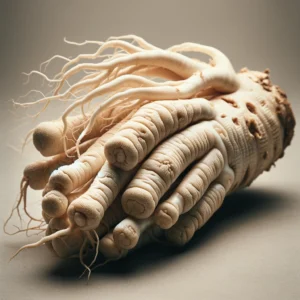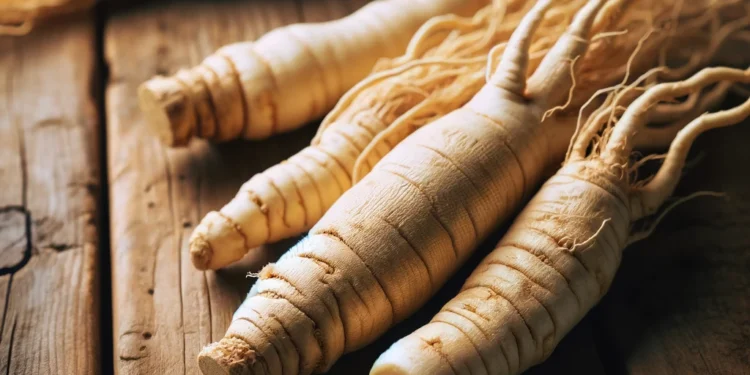One Korean White Ginseng; Revealing Its Powerful Benefits
Introduction
Korean White Ginseng, also known as Panax ginseng, has been used in traditional Chinese medicine for thousands of years. This light-colored ginseng is cultivated in Korea and prized for its high concentration of ginsenosides, the active compounds that provide its many health benefits.
In this comprehensive guide, we’ll explore the history, nutritional profile, health benefits, traditional uses, side effects, and more about this potent adaptogenic herb. Read on to learn how it could be a valuable addition to your wellness regimen.
What is Korean White Ginseng?
Korean White Ginseng (Panax ginseng) is a species of slow-growing perennial plants with fleshy roots. It is part of the Araliaceae plant family and Panax genus. The name “panax” is derived from Greek and means “all-healing”.
There are different varieties of ginseng depending on how it is processed after harvest. White ginseng is harvested when it is 4-6 years old. It is then peeled and air-dried in the sun which gives it a white color. Fresh white ginseng has a more cooling effect on the body compared to red ginseng.
It can grow up to 35–60 cm tall, with large leaves and small greenish-yellow flowers. The most valued part is the large, spindle-shaped root that resembles the human body. This is why ginseng is referred to as an “adaptogen” – helping the body achieve balance and resist stress.
Nutritional Profile
The main bioactive compounds in it are ginsenosides, of which there are over 30 different types. Ginsenosides have been shown to provide antioxidant, anti-inflammatory, anticancer, immune-modulating, and nervous system benefits.
Some other key nutrients and compounds found in Korean White Ginseng include:
- Polysaccharides – improve immune system function.
- Peptidoglycans – have immune-stimulating abilities.
- Phenolic compounds – powerful antioxidants.
- Amino acids
- Minerals like iron, calcium, zinc, manganese.
Compared to other popular adaptogenic herbs like ashwagandha or turmeric, Korean ginseng contains higher levels and a wider variety of ginsenosides. This unique ginsenoside profile is responsible for its potent therapeutic effects.
The Science-Backed Benefits of Korean White Ginseng
Decades of research have uncovered an impressive range of evidence-based health benefits associated with it:
- Reduces Inflammation – Ginsenosides exert anti-inflammatory effects by inhibiting pro-inflammatory mediators like NF-kB. This helps improve conditions like arthritis, eczema, and asthma.
- Boosts Immunity – By stimulating macrophages, NK cells, B cells, T cells, and cytokine production, Korean ginseng enhances the body’s defenses against pathogens. It prevents colds, flus, and infections.
- Supports Heart Health – Ginsenosides help lower blood pressure, cholesterol levels, and oxidative stress – major risk factors for heart disease.
- Helps Manage Blood Sugar – Human studies show it can lower fasting blood glucose in diabetics. It increases insulin sensitivity and insulin production.

- Relieves Stress – As an adaptogen, Korean ginseng regulates cortisol levels and equips the body to handle physical and mental stress.
- Enhances Brain Function – Components in it boost memory, concentration and cognitive performance by improving blood flow and neurotransmitter levels.
- Supports Sexual Health – Traditionally used as an aphrodisiac, it also improves libido, erectile dysfunction, and sexual performance in men and women.
- Slows Skin Aging – With antioxidant and tissue regenerating abilities, Korean ginseng combats wrinkles, dryness, and other visible signs of aging.
Clearly, Korean White Ginseng is so much more than just an energy booster! When taken regularly, it can provide whole-body wellness benefits.
The Role of Korean White Ginseng in Traditional Medicine
In Traditional Chinese Medicine, Korean ginseng is considered an incredibly potent medicinal herb. It was first documented over 2,000 years ago in the Shennong Bencao Jing – the classic herbal medicine text.
According to TCM, ginseng is associated with the lung, spleen and heart meridians. It is used to replenish Qi (energy), strengthen the organs, stimulate blood flow, and promote yang energy. Specifically, it is known to benefit the spleen-pancreas-stomach network.
Contemporary research has validated many of the traditional uses of it like:
- Treating weakness and fatigue

- Supporting respiratory health
- Lowering blood sugar
- Improving male sexual dysfunction
- Reducing stress and nervous exhaustion
Herbalists may recommend Korean White Ginseng for individuals with “Qi deficiency” and those recovering from an illness. It can be safely used daily for prolonged periods.
Potential Side Effects and Safety Information
When used appropriately, it is likely safe for most healthy adults. The most reported side effect is insomnia, if taken too close to bedtime.
Some other precautions include:
- Avoid large doses above 3-9 grams per day.
- Discontinue use if you experience diarrhea, headaches, rapid heartbeat or mood changes.
- Use cautiously if you have autoimmune diseases, hormone-sensitive conditions, or upcoming surgery.
- Consult your doctor before use if you are pregnant, breastfeeding, or giving to children.
- Avoid combining caffeine, stimulants, alcohol, or blood-thinning medications.
Overall, it has an excellent safety profile. Stick to the recommended dosage and opt for high-quality supplements to avoid adverse effects.
What Foods Contain Korean White Ginseng?

Since Korean White Ginseng is an herbal supplement, it is not naturally found in foods. However, you can incorporate it into your diet in various ways:
- Add ginseng powder or extract to smoothies, juices, oatmeal or yogurt.
- Use ginseng tea bags or loose tea to make hot tea.
- Take ginseng capsules with water before meals.
- Use ginseng oil topically on skin or add drops to skincare.
- Cook soups and stews with fresh or dried ginseng slices.
- Look for ginseng in energy bars, gummies, and beverages.
- Use ginseng honey or candy as an immune-boosting snack.
Combining it with other super-foods can further boost its effects. Try matches like ginseng and ginger, ginseng and goji berries, or ginseng and green tea.
Types of Korean White Ginseng Supplements
Korean White Ginseng is available in the following supplemental forms:
- Capsules: Most convenient way to take standardized doses of ginseng powder.
- Tablets: Compressed powdered form, also providing standardized ginsenoside content.
- Tinctures: Korean ginseng extracted into alcohol solution for fast absorption.
- Powder: Dried and ground Korean ginseng root. Can be added to foods and drinks.
- Tea: Made from ginseng leaves, root powder or extract. Provides hydrating, milder effects.
- Gummies: Chewable ginseng candy form, often combined with vitamins.
- Liquid Extracts: Concentrated liquids offering higher doses in small amounts.
- Skin Creams: Topical ginseng creams to improve skin hydration and collagen.
Look for supplements made from organic, high-quality Korean ginseng and standardized to 4-7% ginsenosides for optimal potency.
Where to Buy Korean White Ginseng
You can easily purchase products online or locally:
- Online retailers like Amazon, iHerb, Vitacost or Swanson Health offer discounts and deliver to your door.
- Health food stores like Whole Foods, Sprouts or The Vitamin Shoppe carry a variety of ginseng supplements.

- Herbal medicine shops and apothecaries are great local sources for buying premium Korean ginseng.
- Asian grocery stores and herbal markets may sell dried Korean ginseng roots in bulk.
- Etsy sellers offer unique ginseng formulations like teas, skincare or pet products.
When possible, buy Korean ginseng grown in Korea for authentic, high-potency products. Prices range from $10 to $30 for supplements.
Sustainability and Environmental Impact
It has become an increasingly popular global crop, leading to concerns about sustainability. Intensive harvesting of wild ginseng has endangered natural habitats.
However, many products today are sustainably cultivated on ginseng farms. Organic certification and fair-trade practices also help minimize environmental impact.
It remains one of the most expensive medicinal plants in the world. Prices have risen globally due to supply limitations. This provides income incentives for rural ginseng farmers.
Using trusted brands that follow ethical and eco-friendly sourcing ensures your ginseng benefits the environment too.
FAQs
How much Korean White Ginseng should I take daily?
- The generally recommended daily dose is 1-2g of Korean White Ginseng powder or 200-400mg capsules. It’s best taken early in the day. Consult an herbalist or naturopath for personalized dosage guidance.
When should I take Korean ginseng?
- For energy and performance benefits, take supplements early in the day or an hour before activities. For nighttime use, take smaller doses 4+ hours before bedtime.
Is Korean ginseng safe for women?
- Yes, it is safe for women when used appropriately. Avoid large doses during pregnancy and breastfeeding. Discontinue use if you notice hormonal side effects like breast tenderness, menstrual changes, etc.
Can I take Korean ginseng long term?
- It is safe for long term, daily use. Cycle your dosage, taking regular 1-2 week breaks after every 2-3 months of continued use to avoid developing tolerance.
Is Korean ginseng good for weight loss?
- Some early research shows it may help boost metabolism, increase fat oxidation, and aid weight loss efforts when combined with diet and exercise. More studies are still needed.
Conclusion
With its long history of traditional use and strong scientific backing, Korean White Ginseng is clearly a valuable medicinal herb for whole-body health and wellness. Adding this adaptogenic superfood to your routine can help you fight fatigue, stress, illness, cognitive decline, and much more. As with any new supplement, speak with your healthcare provider before use, especially if you have any medical conditions or take prescription medications.
Sources:
https://www.nccih.nih.gov/health/asian-ginseng
https://www.gaiaherbs.com/blogs/herbs/ginseng
https://www.mountsinai.org/health-library/herb/korean-ginseng
https://www.healthline.com/nutrition/ginseng-benefits
https://www.verywellhealth.com/the-benefits-of-korean-ginseng-89030
















